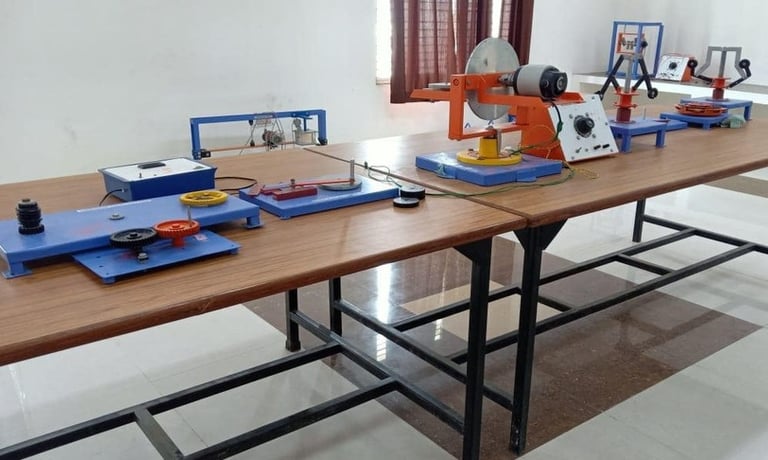

Mechanical Engineering
Department of
LABORATORIES
The Theory of Machines Lab in an engineering college provides hands-on experience with mechanical systems and mechanisms studied in theoretical courses. It is designed to help students understand the principles of kinematics and dynamics of machines. The lab is equipped with various models and apparatus such as gear trains, cam-follower mechanisms, gyroscopes, flywheels, and governors. Through experiments, students learn to analyze motion, determine velocity and acceleration, and understand force transmission in mechanical systems. This practical exposure reinforces theoretical knowledge and develops essential engineering skills.
The CNC (Computer Numerical Control) Lab in an engineering college is designed to provide students with practical knowledge of automated machining and modern manufacturing processes. The lab is equipped with CNC turning and milling machines, simulation software, and programming tools. Students learn to write and execute G-code, operate CNC machines, and understand the fundamentals of precision machining. This lab helps bridge the gap between traditional machining techniques and advanced manufacturing technologies, preparing students for industry-ready skills in automation and production engineering.
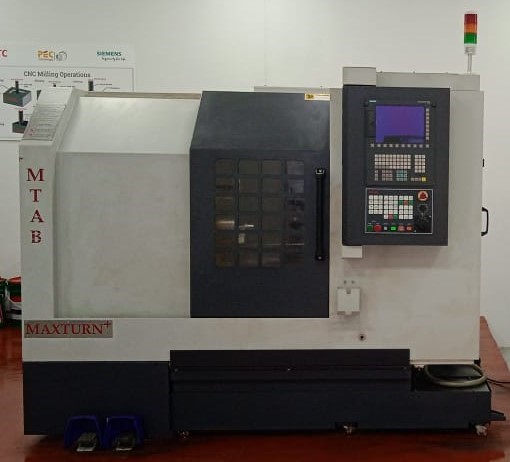

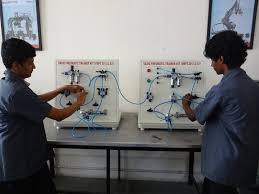

The Industrial Hydraulics and Pneumatics Lab in an engineering college provides students with practical exposure to fluid power systems used in automation and industrial applications. The lab is equipped with hydraulic pumps, pneumatic compressors, actuators, valves, and simulation kits. Students learn to design, assemble, and troubleshoot basic and advanced hydraulic and pneumatic circuits. Through hands-on experiments, they gain a deep understanding of pressure control, flow regulation, and system dynamics, which are essential for careers in manufacturing, automation, and mechanical system design.
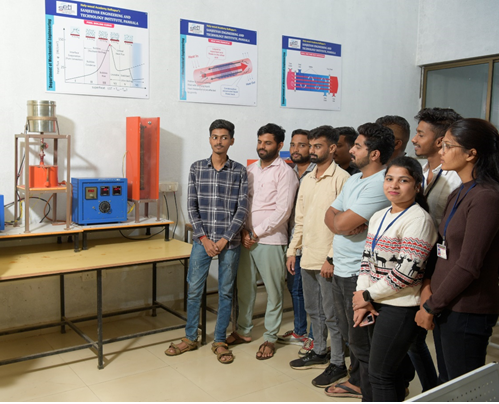

The Thermal Engineering Lab in an engineering college is designed to provide students with practical knowledge of heat transfer, thermodynamics, and energy conversion systems. The lab includes equipment such as IC engines, calorimeters, heat exchangers, and refrigeration and air-conditioning test rigs. Students conduct experiments to study engine performance, measure thermal efficiency, and analyze heat transfer through conduction, convection, and radiation. This hands-on experience strengthens theoretical understanding and prepares students for real-world applications in power plants, automotive engineering, and thermal system design.
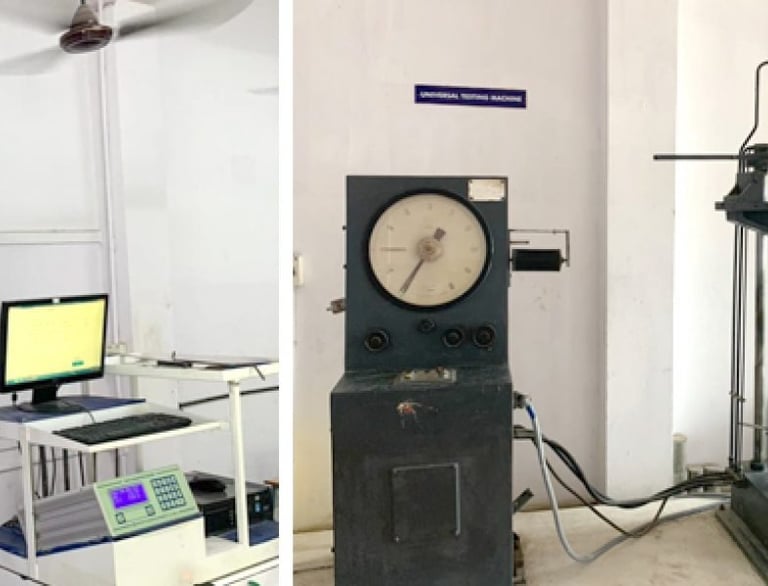

The Strength of Materials Lab is designed to help students understand the behaviour of materials under various types of loads. It provides hands-on experience in testing and analysing the mechanical properties of materials such as tensile strength, compressive strength, hardness, impact resistance, and elasticity. This lab plays a crucial role in building foundational knowledge for structural analysis and material selection in engineering design
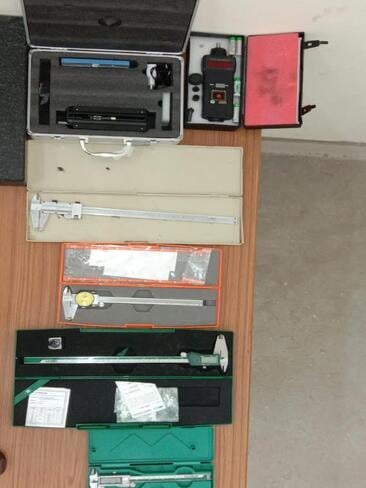

The Metrology and Quality Control Lab in an engineering college offers practical training in precision measurement and inspection techniques essential for manufacturing and engineering quality assurance. The lab is equipped with instruments like vernier callipers, micrometres, surface roughness testers, and gauges. Students learn to perform accurate dimensional measurements, understand tolerances, and apply statistical quality control methods. This hands-on experience helps develop skills in maintaining product quality, ensuring compliance with standards, and improving manufacturing processes.


The Metallurgy Lab in an engineering college provides students with practical knowledge of the properties, structure, and processing of metals and alloys. Equipped with tools for sample preparation, microscopic examination, hardness testing, and heat treatment, the lab allows students to study metal microstructures and mechanical properties. Through hands-on experiments, students learn about phase transformations, metal strengthening techniques, and material behaviour under different conditions, which are crucial for materials selection and engineering design.
The Workshop Lab in an engineering college offers students practical exposure to basic manufacturing and fabrication skills. It is equipped with various tools and machines for carpentry, fitting, welding, smithy, and sheet metal work. Students learn fundamental techniques like measuring, cutting, joining, and shaping materials. This hands-on training helps develop essential craftsmanship, safety practices, and a strong foundation in engineering workshop processes, preparing students for advanced manufacturing and design tasks
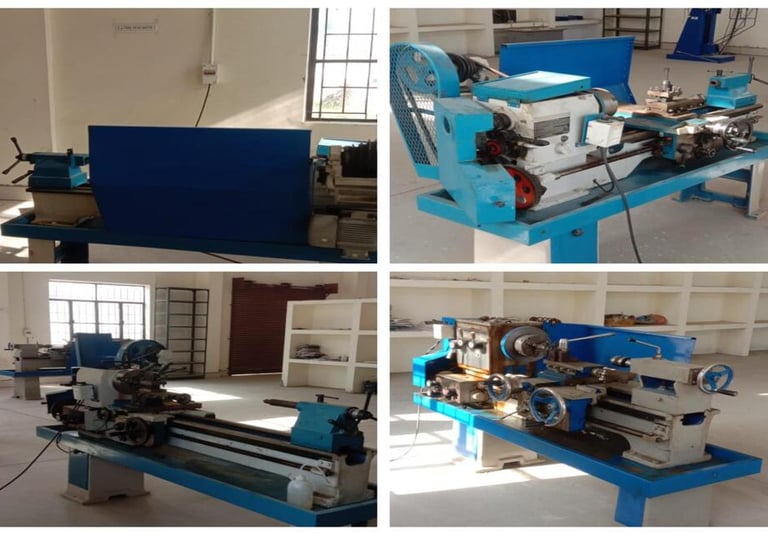

The CAD/CAM (Computer-Aided Design and Computer-Aided Manufacturing) Laboratory provides engineering students with hands-on experience in modern design and manufacturing technologies. The lab is equipped with advanced software tools such as AutoCAD, SolidWorks, CATIA, and CAM software for CNC programming. Students learn to create 2D and 3D models, simulate mechanical systems, and generate tool paths for manufacturing. The lab bridges the gap between design and production, fostering skills in digital design, product development, and automated manufacturing processes essential for modern engineering practice


The Fluid Mechanics Laboratory is designed to help engineering students understand the fundamental principles of fluid behaviour through practical experiments. The lab is equipped with various apparatus such as flow meters, venturi meters, notches, orifice meters, and Reynolds apparatus. Students conduct experiments to study fluid properties, flow patterns, pressure measurements, and energy losses in pipelines. This hands-on experience enhances their understanding of theoretical concepts and prepares them for real-world applications in fields like civil, mechanical, and chemical engineering.


THEORY OF MACHINE LABORATORY
CNC LABORATORY
INDUSTRIAL HYDROLICS AND PNEMATICS LAB
THERMAL ENGINEERING LAB
STRENGTH OF MATERIAL LAB
METROLOGY AND QUALITY CONTROL LAB
METALLURGY LAB
WORKSHOP LAB
CAD/CAM LAB
FLUID MECHANICS LAB
Address
Somwar Peth
Panhala , Kolhapur , Maharashtra
416201
Contacts
9146999500
info@sanjeevanpolytechnic.com
Admission
